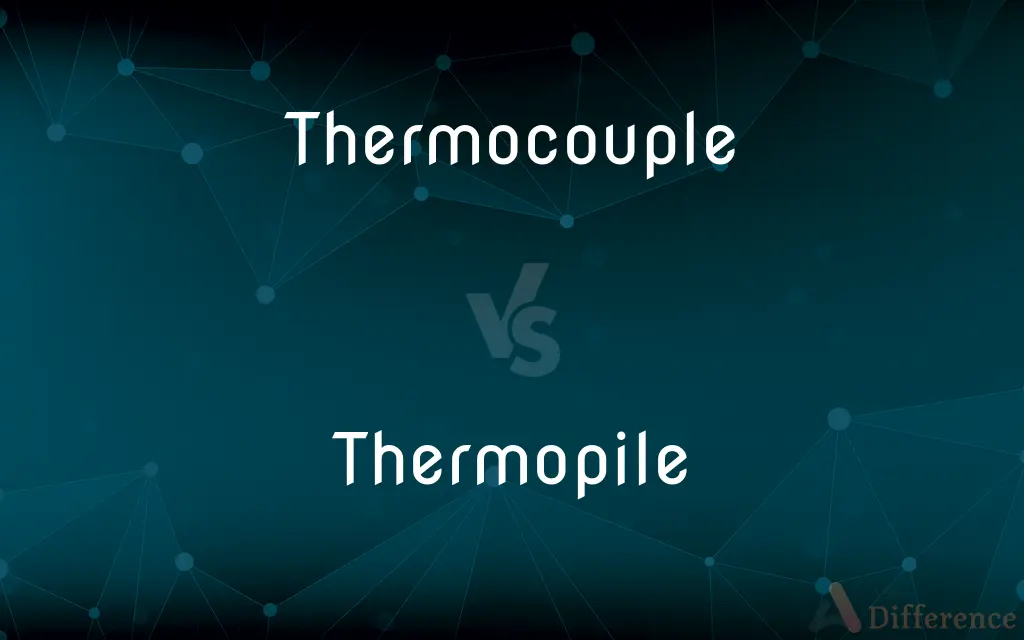Thermocouple vs. Thermopile — What's the Difference?
By Tayyaba Rehman & Fiza Rafique — Updated on September 8, 2023
A thermocouple is a sensor for measuring temperature by using two different metals, while a thermopile is a set of thermocouples connected in series or parallel to amplify the voltage or current.

Difference Between Thermocouple and Thermopile
Table of Contents
ADVERTISEMENT
Key Differences
A thermocouple is essentially a temperature sensor that consists of two different types of metals joined together at one end. When this junction experiences a temperature difference, a voltage is generated, which can be measured to determine the temperature. A thermopile, on the other hand, is a collection of thermocouples that are connected in series or parallel, primarily to amplify the generated voltage for better accuracy.
Thermocouples are commonly used in a wide variety of applications ranging from industrial to household use, like in gas appliances and temperature controllers. Thermopiles find more specialized uses, often in applications that require highly accurate temperature measurements, like in infrared sensors, gas analyzers, and radiometers.
In terms of construction, thermocouples are relatively simpler and more straightforward, often requiring no external power source to function. Thermopiles can be more complex due to their multiple thermocouple connections and may sometimes require an external power source or built-in amplification circuits for improved performance.
Both thermocouples and thermopiles are durable and can withstand extreme conditions, but thermopiles generally offer higher sensitivity and accuracy because of the amplified output. However, thermocouples are typically faster in response time due to their simpler structure, which is a critical factor in certain applications.
Comparison Chart
Basic Function
Measures temperature
Amplifies temperature measurement
ADVERTISEMENT
Complexity
Simpler
More complex
Applications
General-purpose
Specialized
Power Requirement
Usually none
May require external source
Sensitivity
Lower
Higher
Compare with Definitions
Thermocouple
A thermocouple is a temperature sensor made of two dissimilar metals.
The thermocouple in the oven regulates the internal temperature.
Thermopile
A thermopile is an assembly of thermocouples connected in series or parallel.
The thermopile in the infrared sensor increased the output voltage.
Thermocouple
Thermocouples are known for their fast response time.
The thermocouple quickly detected the sudden drop in temperature.
Thermopile
Thermopiles amplify the voltage or current for accurate measurements.
The thermopile's amplified signal made the reading more precise.
Thermocouple
Thermocouples generate voltage based on temperature differences.
The thermocouple produced a higher voltage as the heat increased.
Thermopile
Thermopiles are commonly used in specialized scientific instruments.
The gas analyzer's thermopile ensures highly accurate measurements.
Thermocouple
Thermocouples are used in various industries for temperature control.
Thermocouples in factories maintain optimal operating conditions.
Thermopile
Thermopiles often require an external power source.
The thermopile in the radiometer is powered externally for better performance.
Thermocouple
Thermocouples are often used in household appliances.
The thermocouple in the water heater ensures a constant supply of hot water.
Thermopile
Thermopiles offer higher sensitivity than single thermocouples.
The thermopile detected even the smallest temperature changes.
Thermocouple
A thermoelectric device for measuring temperature, consisting of two wires of different metals connected at two points, a voltage being developed between the two junctions in proportion to the temperature difference.
Thermopile
A thermopile is an electronic device that converts thermal energy into electrical energy. It is composed of several thermocouples connected usually in series or, less commonly, in parallel.
Thermocouple
A thermocouple is an electrical device consisting of two dissimilar electrical conductors forming an electrical junction. A thermocouple produces a temperature-dependent voltage as a result of Seebeck effect, and this voltage can be interpreted to measure temperature.
Thermopile
A set of thermocouples arranged for measuring small quantities of radiant heat.
Thermocouple
A thermoelectric device used to measure temperatures accurately, especially one consisting of two dissimilar metals joined so that a potential difference generated between the points of contact is a measure of the temperature difference between the points.
Thermopile
A device consisting of a number of thermocouples connected in series or parallel, used for measuring temperature or generating current.
Thermocouple
(physics) A transducer consisting of two different metals welded together at each end; a voltage is produced that is proportional to the difference in temperature between the two junctions (one of which is normally held at a known temperature)
Thermopile
(electronics) An electronic device that converts thermal energy into electrical energy. Usually constructed using a series-combination of thermocouples
Thermocouple
A thermoelectric couple.
Thermopile
An instrument of extreme sensibility, used to determine slight differences and degrees of heat. It is composed of alternate bars of antimony and bismuth, or any two metals having different capacities for the conduction of heat, connected with an astatic galvanometer, which is very sensibly affected by the electric current induced in the system of bars when exposed even to the feeblest degrees of heat.
Thermocouple
A kind of thermometer consisting of two wires of different metals that are joined at both ends; one junction is at the temperature to be measured and the other is held at a fixed lower temperature; the current generated in the circuit is proportional to the temperature difference
Thermopile
A kind of thermometer for measuring heat radiation; consists of several thermocouple junctions in series
Common Curiosities
What is the basic function of a thermocouple?
A thermocouple measures temperature.
How are thermocouples and thermopiles different?
A thermocouple is a single unit, while a thermopile is an assembly of thermocouples.
What is the basic function of a thermopile?
A thermopile amplifies temperature measurements.
Which is more complex, a thermocouple or a thermopile?
A thermopile is more complex.
Do thermopiles require an external power source?
They may require one for improved performance.
Can thermocouples and thermopiles be used together?
Yes, thermopiles often consist of multiple thermocouples.
Where are thermocouples commonly used?
In industrial and household applications.
Do thermocouples and thermopiles work on the same principle?
Yes, both work on the principle of thermoelectricity.
Do thermocouples require an external power source?
Usually, they do not.
Which is more sensitive, a thermocouple or a thermopile?
A thermopile is more sensitive.
Are both durable and capable of working in extreme conditions?
Yes, both are durable and can work in extreme conditions.
Are thermopiles accurate in measurement?
Yes, they offer higher accuracy than thermocouples.
Where are thermopiles commonly used?
In specialized scientific instruments.
Are thermocouples fast in response time?
Yes, they are generally faster than thermopiles.
How many thermocouples are in a thermopile?
It varies but usually multiple for amplification purposes.
Share Your Discovery

Previous Comparison
Purple vs. Burgundy
Next Comparison
Tiny vs. PetiteAuthor Spotlight
Written by
Tayyaba RehmanTayyaba Rehman is a distinguished writer, currently serving as a primary contributor to askdifference.com. As a researcher in semantics and etymology, Tayyaba's passion for the complexity of languages and their distinctions has found a perfect home on the platform. Tayyaba delves into the intricacies of language, distinguishing between commonly confused words and phrases, thereby providing clarity for readers worldwide.
Co-written by
Fiza RafiqueFiza Rafique is a skilled content writer at AskDifference.com, where she meticulously refines and enhances written pieces. Drawing from her vast editorial expertise, Fiza ensures clarity, accuracy, and precision in every article. Passionate about language, she continually seeks to elevate the quality of content for readers worldwide.
















































